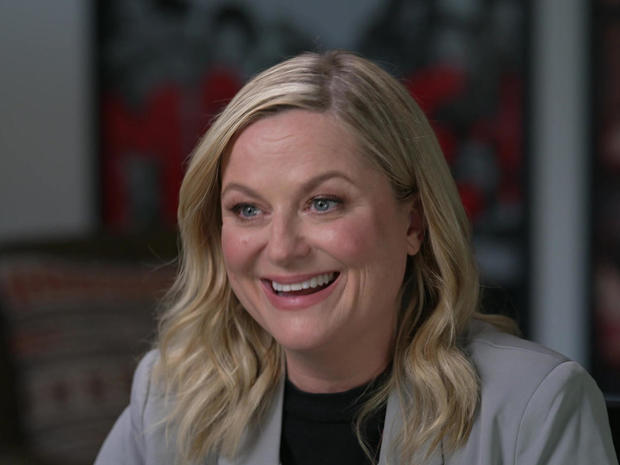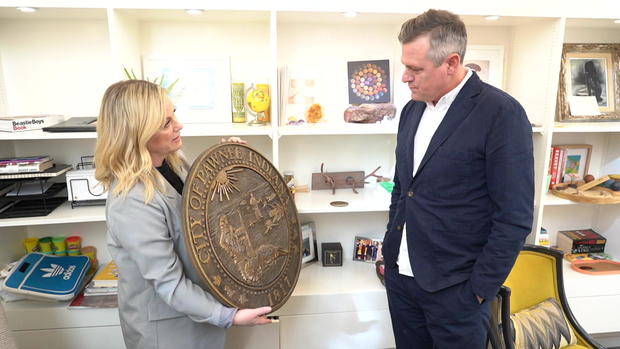Amy Poehler has been on some of comedy’s biggest stages, and has delivered some truly memorable lines, such as her praise for director Kathryn Bigelow at the 2013 Golden Globes: “I haven’t been really following the controversy over ‘Zero Dark Thirty,’ but when it comes to torture, I trust the lady who spent three years married to James Cameron.”
But before all that, of course, she was just a kid, the child of two public school teachers in Burlington, Massachusetts, who couldn’t quite put her finger on it but knew there was something she liked about making people laugh.
Correspondent Luke Burbank asked Poehler, “How big of a deal was being funny to you when you were a kid? Was that part of your personality?”
CBS News
“That’s a deep question, Luke,” she sighed. “Yeah. I did like the feeling of knowing I could make people laugh, or if I tried to be funny it would work. Sometimes I didn’t try, and I got laughs, and that was sad. Those were sad days.”
Mostly though, the laughs Poehler got were intentional, especially as she honed her comedic chops, first in Boston, where she attended college …
“Not Harvard,” she said. “People should know that.”
“You know that it was Harvard when the people don’t clarify,” Burbank said. “If people say, ‘I went to school in Boston,’ it’s probably Harvard.”
“But it wasn’t Harvard. It was Harvard Plus. It was the more fancier Harvard!”
… and then in Chicago, where she joined the legendary Second City improv troupe, and later co-founded Upright Citizens Brigade. It was in Chicago where Poehler met a young Tina Fey, who she connected with instantly – and then re-connected with a few years later at “Saturday Night Live”:
Poehler said, “I loved the people, most importantly. But I also loved the skills I learned in terms of letting things go. It’s like an emergency room. You feel really excited that you survived it, and you also might die if you’re there too long!”
Not wanting to die, Poehler left “SNL” after eight seasons, to play the role that may very well end up defining her career: Leslie Knope in “Parks and Recreation.”
Knope could have been just another two-dimensional sitcom character. But Poehler and the show’s writers managed to do something pretty remarkable with Leslie Knope: they created an entire approach to life.
Burbank said, “This is a whole thing that a lot of people, particularly women, see as a way of viewing their world and their existence.”
“Yeah. I think what she represented was this person in a job that felt like it had a low ceiling, but she had a lot of big hopes and dreams,” said Poehler. “And she was trying to figure out how to work the system or have the system work for her, without losing her sense of joy, spirit, without it crushing her.”
While Hollywood can have a crushing effect on many people, particularly women, Poehler has found a way to thrive, and grow into an influential producer in her own right.
Inside her production office she showed Burbank some of the mementos she’s accumulated over the years. “You ever watch, like, nature documentaries, and magpies grab shiny things to build a nest? That’s what I’ve done here,” she said. “This was the Pawnee seal that was on set and behind Leslie’s desk, and I stole it. And now I put it behind my desk.”
“And this is your real desk where you actually produce things for your production company, Paper Kite?” asked Burbank. “Do you ever, like, look back at the Pawnee seal and think like, ‘Let me try to channel that optimism or energy or whatever it is that Leslie had’?”
“It’s nice to have it behind me, ’cause I worked with it behind me for so many years.”
“I think it’s interesting, too, that this is your day planner …”
Poehler swatted him away: “You’re not allowed to look at that.”
CBS News
Along with producing a variety of projects, Poehler also directs, including most recently “Lucy and Desi,” a documentary about the famous couple.
“Lucy strongly believed that she shouldn’t be labeled a genius because she works really hard, and worked really hard at her craft,” Poehler said. “I think that not enough women are called geniuses. I think that that word is thrown around a lot, but it’s often not given to women as much. So, I like to call Lucy a genius even though I know she would hate it.”
“Do you feel like there are some parallels between your career and her career?” Burbank asked.
“I feel very connected to what I believe she was feeling or going through – How do I balance work and family? How do I take advantage of my currency and my opportunity? How do I amplify voices? How do I take up space in the room? All that kind of stuff that Lucy had to deal with 50 years before I did, or women like me.”
Media profiles of Poehler often focus on her role as a woman in the comedy world. And as our interview drew to a close, Burbank had just one more question he had to get answered:
Burbank said, “They asked me to not ask about this, but I can’t let this go …”
“So you’re, okay, but just pausing … so, they asked you not to ask …?”
“Yes, and I’m going to anyway.”
“That’s interesting. This is telling me more about you, Luke!”
“Are men funny?”
She laughed. “Yeah, they’re getting there. And I’m proud of them. That’s what I wanna say to all the men right now: I’m really, really proud of you. Good job, buddy!“
To watch a trailer for the documentary “Lucy and Desi,” click on the video player below:
For more info:
Story produced by John Goodwin. Editor: Mike Levine.

